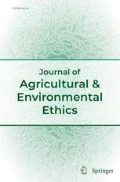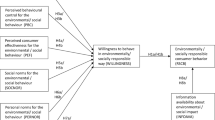Abstract
The quest for a ``theory of nonhuman minds'' to assessclaims about the moral status of animals is misguided. Misframedquestions about animal minds facilitate the appropriation ofanimal welfare by the animal user industry. When misframed, thesequestions shift the burden of proof unreasonably to animalwelfare regulators. An illustrative instance of misframing can befound in the US National Research Council's 1998 publication thatreports professional efforts to define the psychologicalwell-being of nonhuman primates, a condition that the US 1985animal welfare act requires users of primates to promote. Thereport claims that ``psychological well-being'' is a hypotheticalconstruct whose validity can only be determined by a theory thatdefines its properties and links it to observed data. Thisconception is used to contest common knowledge about animalwelfare by treating psychological well-being as a mentalcondition whose properties are difficult to discover. Thisframework limits regulatory efforts to treat animal subjects lessoppressively and serves the interests of the user industry.
A more liberatory framework can be constructed by recognizing thecontested nature of welfare norms, where competing conceptions ofanimal welfare have implications about norm-setting authority, asit does in other regulatory contexts, e.g., food safety. Properlyconceptualized welfare should include both the avoidance ofdistressful circumstances and the relationship between ananimal's capacities to engage in enjoyable activities and itsopportunities to exercise these capacities. This conception ofanimal welfare avoids appropriation by scientific experts.
The development of the psychological well-being regulation is agood illustration of how social norms are contested and thenappropriated, and a critique of this appropriation shows how itcan be challenged.
Similar content being viewed by others
REFERENCES
American Journal of Primatology (Official Journal of the American Society of Primatologists), Supplement 1, 1989. “Psychological Well-Being and Environmental Enrichment” (Wiley-Liss, Inc., 1990).
Branch, M. N., “On the Role of ‘Memory’ in the Analysis of Behavior,” Journal of the Experimental Analysis of Behavior 28(2) (1977), 171–179.
Clingerman, K., S. Gleason, and J. Swanson (AnimalWelfare Information Center), Animal Welfare Legislation: Bills and Public Laws, 1980–1988 (includes the Animal Welfare Act and its amendments). AWIC Series #8 October 1988 (NAL Beltsville, rev. May 1991).
DeGrazia, D., Taking Animals Seriously. Mental Life and Moral Status (Cambridge University Press, New York, 1996).
DeGrazia, D., “Animal Ethics Around the Turn of the Twenty-First Century,” Journal of Agricultural and Environmental Ethics 11(2) (1998/99), 111–129.
Duncan, I. J. H., “Definition of Terms. Animal Welfare and States of Suffering and Pleasure,” SCAW Newsletter 22(2) (2000), 11–13.
Federal Register, Vol. 54, No. 49 (March 15, 1989). Part III, Dept. of Ag. APHIS, 9 CFR Parts 1, 2, and 3 Animal Welfare; Proposed Rules.
Federal Register, Vol. 54 No. 168 (August 31, 1989). Part IV. Dept. of Ag. APHIS, 9 CFR Parts 1, 2, and 3. Animal Welfare; Final Rules.
Federal Register, Vol. 56, No. 32 (February 15, 1991). Part II, Dept. of Ag., APHIS, 9 CFR Part 3. Animal Welfare, Standards; Final Rule.
Haraway, D., “A Pilot Plant for Human Engineering: Robert Yerkes and the Yale Laboratories of primate Biology, 1924–1942,” in Primate Visions. Gender, Race, and Nature in the World of Modern Science (Routledge, London, 1989), pp. 59–83.
Haraway, D., “Animal Sociology and a Natural Economy of the Body Politic: A Political Physiology of Dominance,” in Simians, Cyborgs, and Women. The Reinvention of Nature (Routledge, London, 1991), pp. 43–68.
International Primate Protection League (IPPL), Newsletter Vol. 17, No. 3 (November 1990).
Keeling, M. E. 1990. “A Historical View,” in J. A. Mench and L. Krulisch (eds.), Well-Being of Nonhuman Primates in Research (Scientists Center for Animal Welfare, Bethesda, MD, 1990).
MacCorquodale, K. and P. E. Meehl, “On a Distinction Between Hypothetical Constructs and Intervening Variables,” Psychological Review 55 (1948), 95–107.
Mason, W. A., “Primatology and Primate Well-Being,” American Journal of Primatology (Supplement 1) (1989), 1–4.
Melcher, J., “The Mental Health of Primates. We're Still Needlessly Cruel to Research Animals in Our Labs,” Washington Post, September 8, 1991.
Mench, J. A. and L. Krulisch (eds.), Well-Being of Nonhuman Primates in Research (Scientists Center for Animal Welfare, Bethesda, MD, 1990).
Mench, J. A., S. J. Mayer, and L. Krulisch, The Well-being of Agricultural Animals in Biomedical and Agricultural Research. Proceedings from a SCAW-sponsored conference, Agricultural Animals in Research, held September 6–7, 1990 in Washington, DC (Scientists Center for Animal Welfare, Bethesda, MD, 1992).
National Research Council, The Psychological Well-Being of Nonhuman Primates (National Academy Press, Washington, DC, 1998).
Novak, M. A. and A. J. Petto (eds.), Through the Looking Glass: Issues of Psychological; Well-Being in Captive Nonhuman Primates (American Psychological Association, Washington, DC, 1991).
Novak, M. and S. J. Suomi, “Psychological Well-Being of Primates in Captivity,” American Psychologist 43 (1988), 765–773.
Segal, E., Housing, Care and Psychological Well-Being of Captive and Laboratory Primates (Noyes Publication, Park Ridge, NJ, 1989).
Thomas, R. K. and R. B. Lorden, “What Is Psychological Well-Being? Can We Know If Primates Have It?” in E. F. Segal (ed.), Housing, Care and Psychological Well-Being of Captive and Laboratory Primates (Noyes Publication, Park Ridge, NJ, 1989), pp. 12–26.
US Congress, Office of Technology Assessment, Alternatives to Animal Use in Research, Testing, and Education (US Government Printing Office, OTA-BA-273, Washington, DC, February 1986).
US Congress, Improved Standards for Laboratory Animals Act: and Enforcement of the Animal Welfare Act by the Animal and Plant Health Inspection Service. Hearing before the Subcommittee on Department Operations, Research, and Foreign Agriculture of the Committee on Agriculture House of Representative Ninety-eighth Congress, second session on H.R. 5725. September 19, 1984.
US Congress, House of Representatives, 99th Congress, 1st Session. Report 99–447. Food Security Act of 1985. The Committee of Conference submitted the following report [to accompany H.R. 2100], December 17, 1985.
US Congress, Report to accompany HR 19846. Animal Welfare Act of 1970 (1970).
Vandenbergh, J.G., “Issues Related to ‘Psychological Well-Being’ in Nonhuman Primates,” American Journal of Primatology (Supplement 1) (1989), 9–15.
Author information
Authors and Affiliations
Rights and permissions
About this article
Cite this article
Haynes, R.P. Do Regulators of Animal Welfare Need to Develop a Theory of Psychological Well-Being?. Journal of Agricultural and Environmental Ethics 14, 231–240 (2001). https://doi.org/10.1023/A:1011317314315
Issue Date:
DOI: https://doi.org/10.1023/A:1011317314315



